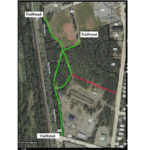Home »

Dolores Redondo is a clever writer
Book Review
By Derryll White
Redondo, Dolores (2015). The Invisible Guardian.
“Forgetting is an involuntary act. The more you want to leave something behind you, the more it follows you.” – William James Barkley.
‘The Invisible Guardian’ is the first published novel for Dolores Redondo, and also the first in a trilogy that has Spain and the Spanish press buzzing. It was chosen Best Crime Novel of the year by a leading Spanish newspaper.
 Redondo is very good at creating a sense of living and society in smaller northern Spanish towns. She pays acute attention as to how people relate to and interact with each other. She also brings alive that sense Spaniards have of the family being central to everything. There are the cafés and squares for endless socializing, but the home contains the intimate workings of the large Spanish family and is essentially closed to all others.
Redondo is very good at creating a sense of living and society in smaller northern Spanish towns. She pays acute attention as to how people relate to and interact with each other. She also brings alive that sense Spaniards have of the family being central to everything. There are the cafés and squares for endless socializing, but the home contains the intimate workings of the large Spanish family and is essentially closed to all others.
The reader walks the streets of Basque country, looking into houses and back rooms in way that would never be permitted to a tourist. Redondo is very adept at capturing the beauty of village and family life. She walks the reader through old Spanish villages, reading the character of the people expressed through the architecture. Beings such as the Basajuan are brought forward, surrounded in debate and doubt, as are our own Sasquatch beings.
‘The Invisible Guardian’ is a fascinating read, for me moreso because my own recent visit to Spain attuned me to the place family plays in Spanish life. Redondo has more packed in this first novel than needs to be there, but then she has a lot to say. Redondo’s lead character, Inspector Amaia Salazar, gives history – the past – power by harbouring an abject fear of it. The author uses this to give tradition and belief even more power, giving the novel much more strength than it would otherwise have. She is a very clever writer.
I really liked this novel. Dolores Redondo tells a very good story. On top of that she leaves the reader with new knowledge about a culture, place and people. By the end I felt drawn to the Basque country as an appealing place to travel to. I highly recommend this first part of a trilogy and I will be looking for the other two books.
As an aside Isabelle Kaufeler has done a very good job of translating this work. It reads very well
********
Excerpts from the novel:
ECHO – There were much more interesting things to do there than listen to the TV and yet it was always on in the background like a poltergeist, ignored as a n absurdity and tolerated out of habit. She had once asked her aunt why and she had replied, “It’s an echo of the world. Do you know what an echo is? It’s a voice you can still hear after the real one has died away.”
LOSS OF LOVE – Most people are mistaken; they believe you can go from love to hate in a moment that love suddenly breaks down, as if your heart had imploded. But, that’s not how it was for me. The love didn’t suddenly break down, but I had a sudden realisation that I had wasted myself in a relentless sanding-down process, scritch, scratch, scratch, scratch, day after day. And that was the day where I realised that there was nothing left.
AUTOPSY – The brutality of the y-shaped incision performed on a corpse is unparalleled by any other surgical procedure. The process, which consisted of removing and weighing the organs and then replacing them in the cavities, was never pleasant, but when the body belonged to a child or a young girl, as in this case, it was unbearable.
BASQUE COUNTRY – “Because you were born and grew up here. Surely you’re not going to tell me you weren’t brought up on these stories? They’re not nonsense, they form part of the culture and history of the Basque Country and Navarra, and we mustn’t forget that what is now considered mythology was originally a religion.”
LOSS – Each time Amaia had seen the body of a minor on the autopsy table she had been overwhelmed by a sense of her own impotence and helplessness and that of the society she lived in. A society where the death of its children signified its inability to protect its own future. A society that had failed.
CROSSROADS – The Place where two roads cross has been considered a place of uncertainty since the olden days. You have to decide which road to follow without knowing who you might cross paths with or who might come along the other path. Imagine it’s the middle of the night with no light available and no signs to indicate which road to choose. The fear became so great that on reaching a crossroads, people would stop and wait for some time on the path along which they had come, listening, sharpening their senses, trying to discern the malign presence of a lost soul. There was a deep-rooted belief that those who had died a violent death and those who had killed them didn’t rest in peace but wandered the roads looking for the right place to go, either to be avenged or where they could find someone to help them carry their burden. And a meeting with one of these beings could make you ill or even mad.”
WITCH – Amaia read the definition of a witch: I use the term witchcraft to refer to that manifestation of the popular spirit which considers certain people to be in possession of extraordinary talents, by virtue of their magical science or their communication with infernal powers.”
TAROT – “The cards are a door, and like a door, you shouldn’t just open it for the sake of it, nor leave it open afterwards. A door, Amaia. Doors don’t do any harm, but what comes through them may do. Remember that you must shut it when you finish your consultation, that what you need to know will be revealed to you, and that what remains dark belongs to the darkness.”
 – Derryll White once wrote books but now chooses to read and write about them. When not reading he writes history for the web at www.basininstitute.org.
– Derryll White once wrote books but now chooses to read and write about them. When not reading he writes history for the web at www.basininstitute.org.







